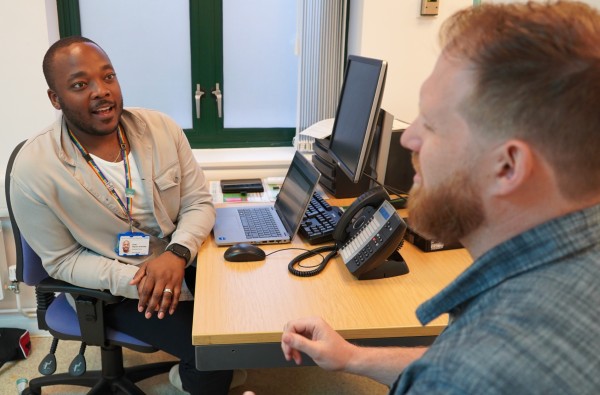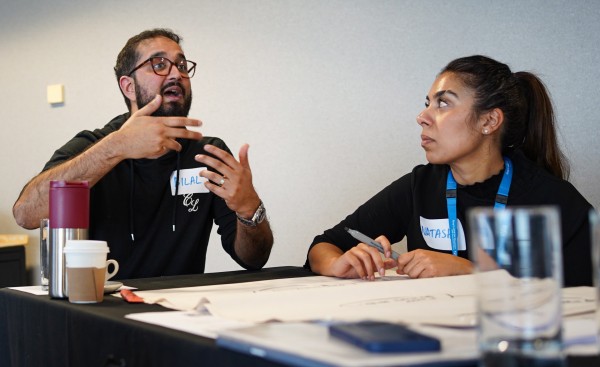Read case studies and evaluations of our previous work.
We are always keen to share our learnings and experience. To find out more about any of these projects please email mindandbody
3DLC was led by King’s College Hospital NHS Foundation Trust, working in partnership with Guy’s and St Thomas’, and South London and Maudsley NHS Foundation Trusts.
The programme provided integrated medical, psychological and social care for people in Lambeth and Southwark who have either heart failure, Chronic Obstructive Pulmonary Disease (COPD), or resistant hypertension - and a mental health and/or social problem, and for whom comorbidity is affecting their ability to self-manage their condition. The 3DLC service was provided by a psychiatrist, a psychologist and a community support worker.
The project was funded by the Health Foundation as part of their Scaling Up Improvement initiative. This built on the success of the 3DFD programme - which demonstrated significant improvement in glycaemic control, depression, anxiety and social outcomes, and produced significant financial savings for the NHS of £850 per patient per year, even after additional investment. 3DLC expands this model to cover three more long term conditions: heart failure, hypertension and COPD. We hope to produce improvements in disease-specific biomedical outcomes, mental health status, quality of life, social functioning and service use.
Read the Evaluation of 3 Dimensions for Long-term Conditions (3DLC) (July 2019). For an accessible version of this document please contact mindandbody
Integrating Mental & Physical healthcare: Research, Training & Services (IMPARTS) was an initiative funded by King’s Health Partners to integrate mental and physical healthcare in research, training and clinical services at Guy’s and St Thomas’, King’s College Hospital, and South London and Maudsley NHS Foundation Trusts. It aimed to improve the support available for patients experiencing psychological distress such as anxiety, low mood or depression, while receiving treatment for a physical health condition.
View key findings and next steps in our digital book. To request an accessible version of this document please contact mindandbody
How did the programme work?
Patients attending King’s Health Partners acute Trusts were asked to answer a series of questions about their health related to their wellbeing, smoking, depression, and anxiety symptoms, along with others tailored to the patient group. Clinicians were able to use the data to guide the patient’s consultation and treatment plan. The data also helped clinicians to refer patients to other relevant services, where appropriate.
Reasons why using IMPARTS in clinics was beneficial:
- Evidence shows that joining up physical and mental healthcare helps patients manage their different conditions, improve their health outcomes, and prevent unnecessary health problems for some people by identifying risk early;
- IMPARTS helps tailor patient consultations to whole-person care;
- Training provided for all staff using the IMPARTS package covers key principles and skills for addressing common mental health needs;
- IMPARTS data is available for research and clinical service audit purposes. For more information, please contact mindandbody
@slam.nhs.uk .
Integrating our Mental and Physical Healthcare Systems (IMPHS) was a three-year funded project commissioned by the Maudsley Charity. It operated within the Mind & Body Programme at King’s Health Partners, hosted by South London and Maudsley NHS Foundation Trust and delivered in partnership with King’s College London. The project concluded in March 2023.
IMPHS delivered a portfolio made up of seven core projects, all of which used implementation science methodologies to:
- Understand barriers that adults living with long-term mental illnesses may face when managing their physical healthcare;
- Test and evaluate interventions that could better facilitate integrated mental and physical healthcare in routine practice for patients accessing services both now and in the future.
The key projects included research into the use of digital interventions, a feasibility trial evaluating the use of Health Champions, a service evaluation on approaches to physical healthcare in adult community mental health settings, and collaboration across mental health and acute care providers to evaluate the use of interventions such as a Physical Health Clinic, Consultant Connect, and a Pharmacy Network. You can find out more via the IMPHS webinar series. For more information about the academic evaluation completed as part of this project please email mindandbody
Overall, the project aimed to develop a body of work that could be shared with healthcare staff, commissioners, researchers, patients, and carers to support high quality physical healthcare for adults with long-term mental health problems. The team compiled a legacy toolkit that shares all key learning from this project and can be accessed through the Mind and Body Improvement Network.
The Leukaemia UK Mind & Body Team project, funded by Leukaemia UK at King’s College Hospital NHS Foundation Trust, aimed to improve emotional and wellbeing care for individuals with blood cancer. Led by a dedicated team including a Psychiatrist, Clinical Psychologist, and Social Worker, the project recognised the unique psychological impacts of treatments for blood cancers, which often involve isolation and lack of social contact. The project implemented psychosocial health screening for myeloma patients, resulting in increased access to psychological therapies and support for practical and social needs.
Key outcomes included successful implementation of screening, increased identification of patients' social and psychological needs, and the establishment of a dedicated mind and body clinic. Additionally, the project provided prehabilitation services to optimize patients before bone marrow transplants and rehabilitation services during systemic treatment.
The project also focused on staff education and support, offering supervision groups, micro-teaching sessions, and clinician training to ensure staff could effectively identify and respond to patient needs.
Overall, the project's success led to continued funding for additional staff and services in haemato-oncology, demonstrating the importance and effectiveness of a holistic approach to care for individuals with blood cancer.
For more detail, please contact mindandbody
Resource for Electronic Development of Interventions for Talking Therapies in Long-Term Conditions (RE-EDITT) developed online Cognitive Behavioural Therapy (CBT) treatment for anxiety and depression in people with long-term conditions.
The project was led by a group of Clinical Health Psychology researchers at King’s College London, based at Guy’s Hospital. Research shows that around 30% of people with a physical long-term condition (LTC) also experience mental health problems.
There are existing tools for delivering online CBT. However, these are not as effective as they could be for those with LTCs because the context of the LTC and lived experience of the patient is often not taken into consideration. The impact of the LTC and factors involved in the psychological adjustment of living with a long-term illness may require specialist support different to that offered for primary mental health issues.
To create the website and hosting platform, the team worked with SPIKA, a technical agency which focuses on writing software solutions to create engagement. The initial programme had been designed as suitable for a range of different LTCs. Tailored programmes followed for specific patient populations could be ‘cloned’, for example developing a version of Compass specifically targeted at those with Multiple Sclerosis (MS).
The project built a clear pathway for patients to enter treatment by linking with mind and body partners including Integrating Mental & Physical healthcare: Research, Training & Services (IMPARTS), IAPT, clinical health psychology, and liaison psychiatry.
For more detail on any of these projects, please contact mindandbody
SHRINE (Sexual and Reproductive Health Rights Inclusion and Empowerment): was a five-year programme, which launched in May 2016 and was funded by Guy’s and St Thomas’ Charity and worked in partnership with Mind and Body to join up mental and physical healthcare.
SHRINE used a human-rights based approach to deliver and evaluate sexual and reproductive healthcare for specific communities in Lambeth and Southwark:
- people who use drugs problematically;
- people with serious mental illness;
- people with intellectual disabilities.
SHRINE tested and evaluated two innovative care delivery models to understand the best way to provide care:
- Pathway one: looked at in-reach clinics and assertive outreach (also known as “clinic in a backpack”). This involved seeing patients where they were located, such as addictions services psychiatric inpatient wards, community mental health teams, postnatal ward, mother and baby units, homeless hostels, using charities to work with vulnerable people and if necessary, occasional home visits.
- Pathway two: the second looked at priority access appointments and fast track pathways. This involved providing last-minute and flexible appointments within an established, complex clinic at the mainstream Camberwell Sexual Health Clinic in south London.
For more detail, please contact mindandbody






